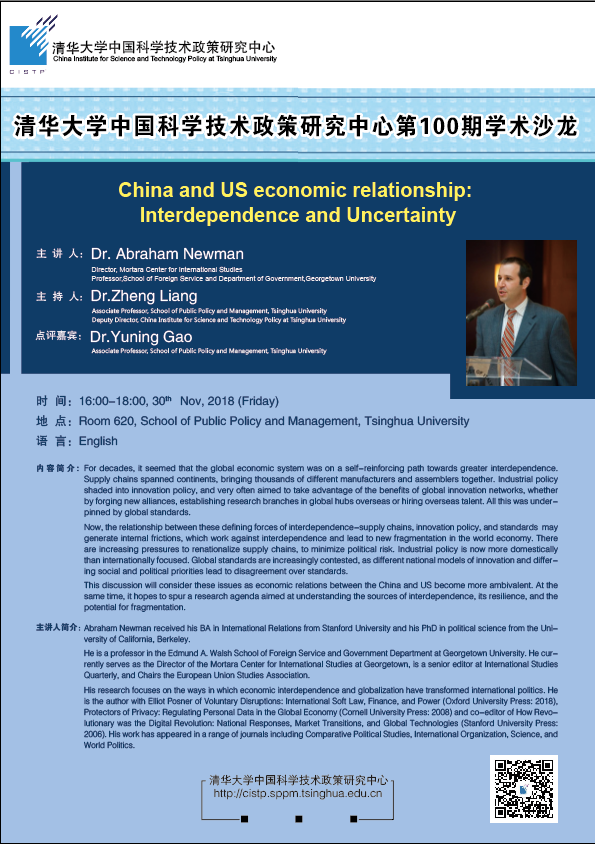Welcome to CISTP'S 100st Academic Salon
China and US economic relationship: Interdependence and Uncertainty

Lecturer: Dr. Abraham Newman
Director, Mortara Center for International Studies
Professor,School of Foreign Service and Department of Government, Georgetown University
Moderator: Dr.Zheng Liang
Associate Professor, School of Public Policy and Management, Tsinghua University
Deputy Director, China Institute for Science and Technology Policy at Tsinghua University
Time: 16:00-18:00, 30th Nov, 2018 (Friday)
Place: Room 620, School of Public Policy and Management, Tsinghua University
Language: English
Content about:
For decades, it seemed that the global economic system was on a self-reinforcing path towards greater interdependence. Supply chains spanned continents, bringing thousands of different manufacturers and assemblers together. Industrial policy shaded into innovation policy, and very often aimed to take advantage of the benefits of global innovation networks, whether by forging new alliances, establishing research branches in global hubs overseas or hiring overseas talent. All this was underpinned by global standards, which provided supply chains with common production norms and the supporting infrastructure for innovation at the regional level.
Now, the relationship between these defining forces of interdependence – supply chains, innovation policy, and standards – may generate internal frictions, which work against interdependence and lead to new fragmentation in the world economy. There are increasing pressures to renationalize supply chains, to minimize political risk. Industrial policy is now more domestically than internationally focused. Global standards are increasingly contested, as different national models of innovation and differing social and political priorities lead to disagreement over standards. And these trends could potentially reinforce each other as localized supply chains rely on regional standards to reinforce the near term advantages of firms.
This discussion will consider these issues as economic relations between the China and US become more ambivalent. At the same time, it hopes to spur a research agenda aimed at understanding the sources of interdependence, its resilience, and the potential for fragmentation.
Lecturer Information:

Abraham Newman received his BA in International Relations from Stanford University and his PhD in political science from the University of California, Berkeley.
He is a professor in the Edmund A. Walsh School of Foreign Service and Government Department at Georgetown University. He currently serves as the Director of the Mortara Center for International Studies at Georgetown, is a senior editor at International Studies Quarterly, and Chairs the European Union Studies Association.
His research focuses on the ways in which economic interdependence and globalization have transformed international politics. He is the author with Elliot Posner of Voluntary Disruptions: International Soft Law, Finance, and Power (Oxford University Press: 2018), Protectors of Privacy: Regulating Personal Data in the Global Economy (Cornell University Press: 2008) and co-editor of How Revolutionary was the Digital Revolution: National Responses, Market Transitions, and Global Technologies (Stanford University Press: 2006). His work has appeared in a range of journals including Comparative Political Studies, International Organization, Science, and World Politics.